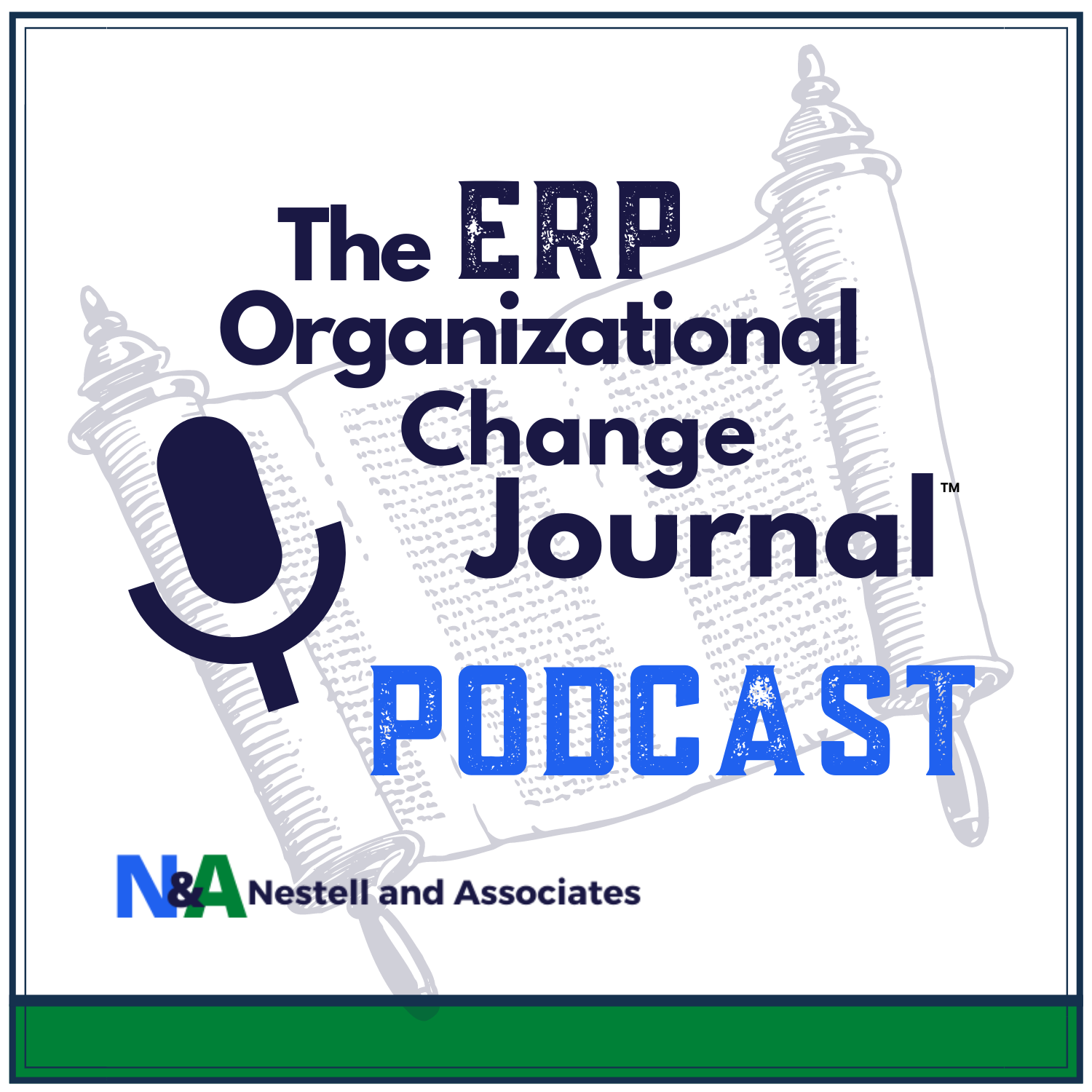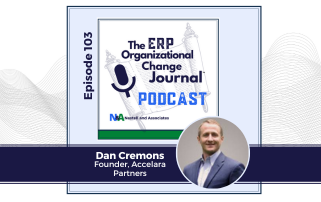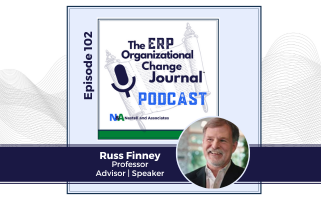
In this episode, we explore AI’s Impact on ERP and how it’s reshaping the future of Enterprise Resource Planning (ERP) and organizational evolution.
As the business landscape rapidly shifts, our expert guest David Shapiro offers invaluable insights into the convergence of AI, business strategies, and the nuances of private equity. Tailored for Private Equity Firms, portfolio companies, and stakeholders in ERP organizational change, this episode is a crucial guide to navigating the future of business transformation.
Guest

David Shapiro
AI Thought Leader | Strategic & Product Consultation | Independent Researcher
David has 16 years of IT infrastructure and automation experience and has worked for notable companies as Cisco Systems and Duke University. During that time, he developed an interest in AI, ML, and large-scale automation. With the advent of generative AI technology, David pivoted to promote his independent research and experiments on GitHub and YouTube, amassing more than 60,000 subscribers at the time of recording. David’s work in enterprise scale IT cloud and automation, combined with his expertise in AI gives him a unique perspective on the impact that AI will have at all levels of a business.
Connect
Host & Founding Partner of Nestell & Associates

Dr. Jack G. Nestell
Founding Partner | Nestell & Associates
Dr. Jack G. Nestell is a highly accomplished IT and ERP business advisor, author, and speaker with over 30 years of experience in leadership and implementation of ERP systems across various industries. He is the founding partner of Nestell & Associates, a management and strategy firm that specializes in organizational change, readiness, and ERP implementation. Dr. Nestell is also an accomplished academic researcher who has contributed to ERP research. With his practical expertise and academic knowledge, he provides innovative and proven solutions for his clients.
Episode Highlights Timeline
[06:10] Segment 1: AI’s Impact on Business Systems and ERP
In your popular videos, you discuss how AI can create a post-scarcity leisure class, where corporations can produce more with less. Let’s talk about this in the context of business systems and ERP.
- Post-Singularity Predictions – How will our lives, corporations, and nations adapt to AI revolution?
- Post-Labor Economics: What happens when AI changes work forever?, https://www.youtube.com/watch?
- How can AI redefine ERP and other business systems, particularly in the context of increasing productivity and reducing workforce?
- Speaking of harm the bus…..Do you have any thoughts on this…….What changes do you foresee in financial systems and policies and regulations due to AI, and how might this impact ERP structures?
[12:39] Segment 2: Global Collaboration in AI Development
You have another video about the importance of global collaboration and dialogue in AI development. Let’s draw parallels to that discussion.
The AGI Moloch: Nash Equilibrium, Attractor States, and Heuristic Imperatives: How to Achieve Utopia”
- How can such collaboration shape AI’s evolution in business and ERP contexts?
- What role could regulatory frameworks play in promoting ethical AI use in corporate landscapes?
- Let’s chat more about the ‘Alignment and Control problem”, How might the Heuristic Imperatives guide the pursuit of positive outcomes in AI development and application within businesses? Your solution to all of this is what you call “heuristic Imperatives”, Can you please elaborate?
[22:44] Segment 3: AI, People, and Organizational Change
Regarding your video about Ray Kurzweil’s (Curts-While) prediction of biological immortality and its implications, let’s bring it back to AI’s potential role in organizational change.”
logical Immortality by 2030: Social & Economic Implications + Some Predictions!,
You state in this video that “compounding returns and that it is nearly impossible to predict how new technologies will recombine specifically accurately. AI, nanotech, genetics, quantum computing, and other scientific breakthroughs will almost certainly combine in unexpected ways.” You then alluded to the iPhone….
- When you think of the impact from more of a social perspective, How could advancements in AI catalyze organizational change in M&A environments?
- What strategies should businesses adopt in order to manage changes that come with AI implementation?
- What we do know is that Corporate culture is crucial to ERP organizational change success. Could the emergence of new tech domains and markets due to AI influence corporate culture and employee engagement?
[35:35] Segment 4: AI in Post-Labor Economics and its Impact on Businesses
You’ve talked about post-labor economics in your videos. I’m intrigued to discuss its relevance to ERP organizational change.
- How could the shift to post-labor economics affect businesses and their ERP or business systems?
- AI can fundamentally change the relationship between human labor and business. How might re-distributive policies such as universal basic income impact businesses, ERP, and business systems?
- I am sure that this is a pretty unique question. But In the context of post-labor economics, how can new measures of well-being, like the Well-Being Index or Maslow’s hierarchy of needs, be integrated into future ERP systems?
[44:20] Segment 5: AI and Business Strategy
Drawing from your video on Elon Musk’s focus on AI and its alignment with human goals, I have a couple of questions regarding strategic implications of AI in business.
Elon Musk xAI “Maximize Understanding of the Universe” [This is the best news all year]
- How can businesses, especially those involved in M&A, incorporate AI into their strategic planning, keeping the objective function of maximizing understanding in mind?
- What strategies can businesses employ to ensure that their AI initiatives align with human curiosity and the goal of understanding?
[52:20] Segment 6: Optimism about the Future of AI
You mention in your video DeepMind, OpenAI, Microsoft, Oxford: Global AI Research & Regulation is Coming that you are deeply optimistic about the future of AI. Why? But I also know that you are not saying that AI is a “Salvation Fantasy: The False Promise of Utopia, FDVR, Escapism, and Techno-Optimism”,
I know you discussed this in two different videos, but why do you feel optimistic at the same time saying that AI isn’t a “Salvation Fantasy”? Do you believe in an AI balance? Why?
Harness the Power of AI in Your ERP and Drive Transformative Change!
Our specialized services are tailored for Private Equity Firms and their portfolio companies, ensuring seamless integration and maximized returns. Dive into the future of business transformation with us.
Related Episodes – AI’s Impact on ERP
Episode 85: Harnessing AI for ERP Innovation: Balancing Growth, Ethics, and Governance
Episode 50: Digital Transformation using Emerging Technologies
Episode 38: How Artificial Intelligence is Transforming the ERP Systems
Latest Episodes
Human Capital in PE-Backed Companies: Strategies for Leadership and Talent Management
Human Capital in PE-Backed Companies: Strategies for Leadership and Talent ManagementEpisode Overview - PE-backed Human Capital Strategies Today’s episode centers on the pivotal role of human capital in PE-backed companies, emphasizing how strategic leadership and...
ERP Organizational Change: Technology Strategy
ERP Organizational Change: Technology Strategy and Keys to SuccessEpisode Overview - Technology Strategy In general, at the highest level of categorization, there seems to be consensus on the importance of people and culture, informational technology, and project...
AI and Private Equity Synergy: Fueling Business Transformation
AI and Private Equity Synergy: Fueling Business TransformationEpisode Overview - AI in PE Strategies In this episode, we explore how AI and Private Equity synergies are fueling business transformations and reshaping investment strategies and operational efficiencies....
About Nestell & Associates
Nestell & Associates is a highly specialized IT and ERP change management consulting firm that serves as a business-savvy, tenured, and highly technical-proficient business partner to private equity firms. We provide expert vendor-neutral IT and ERP services necessary to support their business objectives. Our team of experts excels at organizational change, preparedness, and digital transformation success.
Our approach has been proven to be successful by focusing on key areas such as organizational culture, change, and readiness, we’ve helped our clients achieve their IT and ERP business objectives from improving IT security to managing complex transformational M&A initiatives.
We are passionate about helping our clients succeed and achieving positive outcomes. Our goal is to provide the most efficient, organized, experienced, and productive professionals in the industry to implement processes, resources, and technology that will give our private equity partners a competitive advantage and deliver real return on investment.




0 Comments